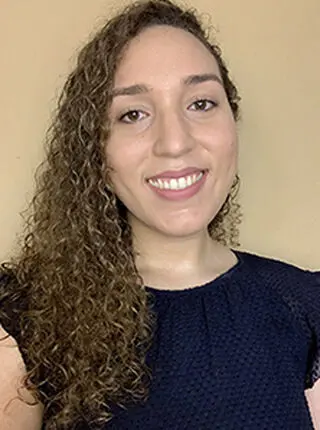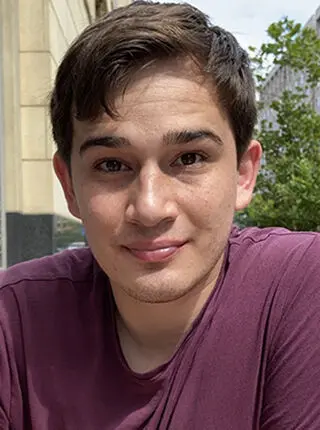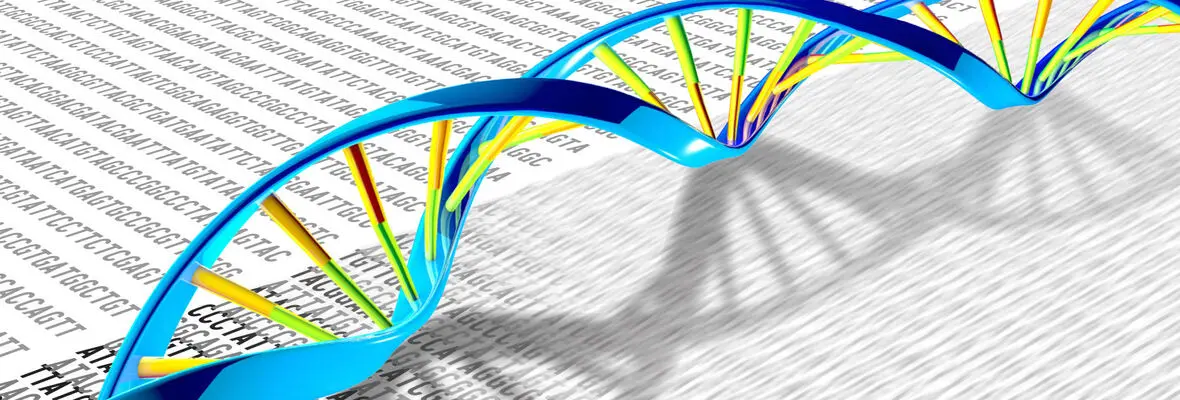Current Students
Michaella Bono
Advisor: TBD
Matriculation: 2024
Education
BS Neuroscience, Virginia Polytechnic Institute and State University
Background
Michaella Bono conducted research at the NIH in Dr. Han-Yu Shi’ s laboratory at the National Eye Institute (NEI). Michaella’s research interests are centered on the intersection of immunology and neuroscience. Specifically, her work aims to elucidate the role of CD8+ T cells in driving immunopathology in Alzheimer's disease.
Hannah Dobson
Advisor: TBD
Matriculation: 2023
Education
BS in Cell and Molecular Biology, University of Rhode Island
Background
After her graduation, Hannah Dobson has pursued research in fungal pathogenesis, cancer immunotherapy, and autoimmune diseases. At the University of Wisconsin-Madison, Hannah investigated the efficacy of CD4+ T cell responses from mucosal and subcutaneous subunit vaccinations. In Dr. James Moon’s Lab at the University of Michigan, she studied immune responses in the tumor microenvironment triggered by STING-agonist-loaded nanomaterials and examined how nanoparticles delivering self-antigens could induce tolerance, potentially leading to new autoimmune disease treatments. Hannah's research interests focus on the interactions between innate and adaptive immunity and their implications for infectious and autoimmune diseases.
Christopher Garliss
Advisor: TBD
Matriculation: 2024
Education
BS Bioengineering, University of Maryland College Park
Background
During the COVID-19 pandemic, Chris Garliss joined Avidea Technologies, where he made crucial contributions to the development of SNAPVax nanoparticles, designed to elicit strong T cell and B cell responses. His innovative work continued with the generation of a novel series of SNAPVax nanoparticles to promote immunotolerance. This research contributed to the development of a vaccine candidate for Celiac disease, now advancing to first-in-human trials. His passion for research is driving him to seek opportunities that combine his interests in engineering and immunology.
Lufti Huq
Advisor: TBD
Matriculation: 2023
Education
BA College of Arts and Sciences, Cornell University
Background
Lutfi Huq graduated from Cornell University a Bachelor of Arts from the College of Arts & Sciences, where he studied biology, mathematics, and computer science. Prior to joining the Program, Lutfi has completed research internships at Stanford Medical School, Mayo Clinic, and the NIH in the laboratories of Drs. Yasmine Belkaid and Steve Rosenberg. He is a recipient of the American Australian Association (AAA) Fellowship for his work on tissue-resident T cells, their developmental pathways, and their use in novel cell-based treatments against cancer and infection at the University of Melbourne in the laboratory of Dr. Laura Mackay. In the Program, he intends to investigate patient-specific immunotherapy treatments for solid tumors. His long-term aspiration is to become a physician scientist and conduct bench-to-bedside research in the fields of immunology, oncology, and gastroenterology at an academic medical institution.
Tim Johnston
Advisor: Dr. Daniel Douek (Vaccine Research Center, NIAID)
Matriculation: 2022
Education
BS in Biology, University of Minnesota
Background
In his senior year, Tim Johnston joined David Masopust’s laboratory to study anti-viral T cell responses, particularly the role of tissue-resident memory T cells (TRM) in barrier immunity against influenza. As a postbaccalaureate IRTA fellow at the NIH Vaccine Research Center under Dr. Daniel Douek, Tim developed a rapid, high-throughput method for monoclonal antibody discovery. He successfully isolated neutralizing antibodies against pathogens including SARS-Co V2, influenza, HIV, norovirus, and Zika.
Research
Tim is interested in studying how initial exposures to SARS-CoV-2 shape humoral responses to future exposures to mutated variants of the virus. He hopes to use insights from single cell sequencing of B cells and monoclonal antibody production to improve vaccine design.
Publications from Graduate Work
- Johnston, T.S., Li, S.H., Painter, M.M., Atkinson, R.K., Douek, N.R., Reeg, D.B., Douek, D.C., Wherry, E.J., Hensley, S.E. Immunological imprinting shapes the specificity of human antibody responses against SARS-CoV-2 variants. Immunity 2024 57:912-925 https://doi.org/10.1016/j.immuni.2024.02.017
- Matassoli, F., Cagigi, A., Shen, C.-H., Henry, A.R., Johnston, T.S., Schramm, C.A., Cottrell, C.A., Kalyuzhniy, O., Spangler, A., Ndung’u, T., Dong, K., Eller, L., Robb, M., Eller, M., Naluyima, P., Kwong, P.D., Douek, D.C., Schief, W.R., Andrews, S.F., McDermott, A.B. High frequency of HIV precursor-target-specific B cells in sub-Saharan populations. Cell Reports 2023 42:113450. https://doi.org/10.1016/j.celrep.2023.113450
- Painter, M.M., Johnston, T.S., Lundgreen, K.A., Santos, J.J.S., Qin, J.S., Goel, R.R., Apostolidis, S.A., Mathew, D., Fulmer, B., Williams, J.C., McKeague, M.L., Pattekar, A., Goode, A., Nasta, S., Baxter, A.E., Giles, J.R., Skelly, A.N., Felley, L.E., McLaughlin, M., Weaver, J., Kuthuru, O., Dougherty, J., Adamski, S., Long, S., Kee, M., Clendenin, C., da Silva Antunes, R., Grifoni, A., Weiskopf, D., Sette, A., Huang, A.C., Rader, D.J., Hensley, S.E., Bates, P., Greenplate, A.R., Wherry, E.J. Prior vaccination promotes early activation of memory T cells and enhances immune responses during SARS-CoV-2 breakthrough infection. Nature Immunology 2023 24:1711–1724. https://doi.org/10.1038/s41590-023-01613-y
- Wang, S., Matassoli, F., Zhang, B., Liu, T., Shen, C.-H., Bylund, T., Johnston, T.S., Henry, A.R., Teng, I.-T., Tripathi, P., Becker, J.E., Changela, A., Chaudhary, R., Cheng, C., Gaudinski, M., Gorman, J., Harris, D.R., Lee, M., Morano, N.C., Novik, L., O’Dell, S., Olia, A.S., Parchment, D.K., Rawi, R., Roberts-Torres, J., Stephens, T., Tsybovsky, Y., Wang, D., Van Wazer, D.J., Zhou, T., Doria-Rose, N.A., Koup, R.A., Shapiro, L., Douek, D.C., McDermott, A.B., Kwong, P.D. HIV-1 neutralizing antibodies elicited in humans by a prefusion-stabilized envelope trimer form a reproducible class targeting fusion peptide. Cell Reports 2023 42:112755 https://doi.org/10.1016/j.celrep.2023.11275
- Yogev, O., Weissbrod, O., Battistoni, G., Bressan, D., Naamati, A., Falciatori, I., Berkyurek, A.C., Rasnic, R., Izuagbe, R., Hosmillo, M., Ilan, S., Grossman, I., McCormick, L., Honeycutt, C.C., Johnston, T.S., Gagne, M., Douek, D.C., Goodfellow, I., Hannon, G.J., Erlich, Y. From a genome-wide screen of RNAi molecules against SARS-CoV-2 to a validated broad-spectrum and potent prophylaxis. Communications Biology 2023 6:1–12. https://doi.org/10.1038/s42003-023-04589-5
Awards
2024 NIH Graduate Student Research Award
2023 IGG Retreat Poster Award
Adam Kuo
Advisor: TBD
Matriculation: 2024
Education
BS Molecular and Cellular Biology, University of California Berkeley
MA Immunology, Harvard Medical School
Background
Adam Kuo's research experience has been shaped by training in several leading laboratories, including those of Hideo Okada at UCSF, Marcela Maus at Massachusetts General Hospital, and Crystal Mackall at Stanford. At UCSF, Adam contributed to developing SynNotch CAR T cells for glioblastoma treatment, and at Harvard, he focused on advancing CAR T-cell models targeting pancreatic cancer. At Stanford, Adam's focus shifted to genomic assays to enhance the understanding of patient responses in CAR T-cell trials, contributing to critical data for ongoing clinical studies. His current research interests include immune genomics to explore T-cell exhaustion and the tumor microenvironment.

Ivanna Molina-Lopez
Advisor: Dr. P’ng Loke (NIAID)
Matriculation: 2022
Education
BS in Microbiology, University of Puerto Rico, Humacao
Background
Ivanna Molina-Lopez earned her B. S. in Microbiology from the University of Puerto Rico-Humacao. Prior to her current studies in the NIH-University Immunology Graduate Program, she received a postbaccalaureate PREP fellowship for her work in Dr. Kate Fitzgerald’ s laboratory at the University of Massachusetts Chan Medical School. There, she researched the NLRP1 inflammasome' s role in detecting nucleic acids in human keratinocytes. In her graduate studies, Ivanna is focused on expanding her expertise in host-pathogen and host-commensal interactions. She is particularly interested in studying how the microbiota interacts with the immune system, aiming to develop new therapies for infectious and inflammatory diseases.
Research
Ivanna is studying changes in the metabolic activity of macrophages populations during helminth infections. Through her work, she aims to comprehend the relationship between macrophage activation states and their metabolic phenotypes during tissue remodeling. She hopes that the insights gained through her studies will enable the identification of metabolic pathways that could be targeted for treating different inflammatory conditions.
Indira Rao
Advisor: Yasmine Belkaid, PhD
Matriculation: 2018
Education
2003 – 2006 University of Mumbai, India, BSc Chemistry
2007 – 2008 Heriot-Watt University, United Kingdom, MSc Forensic Materials
Research
Host-microbe interactions at barrier tissues mediate context-specific immune responses to commensal microbiota. Staphylococcus aureus can asymptomatically colonize the skin or cause recurrent opportunistic infections with limited protective immunity. My work reveals that homeostatic non-inflammatory skin colonization with S. aureus is sufficient to induce not only local response, but a systemic innate-like T cell response also at mucosal, lymphoid, and metabolic sites. In the mouse model, using microbial genetics, immunophenotyping, imaging and next-generation sequencing methods, I aim to (1) characterize innate-like homeostatic immunity to the topical microbe, (2) investigate how the topical skin microbe promotes said systemic response, and, importantly, (3) what the functional consequences of such a systemic response may be. Specifically, we endeavor to determine whether steady-state immunity represents an anticipatory response for protection during infection. These studies can shed light on the basic biology of how skin commensalism promotes overall metaorganism fitness.
Future Plans
Fundamental and Translational Immunology Research
Publications from Graduate Work
- Sorobetea,D., Matsuda, R., Peterson, S.T., Grayczyk, J.P., Rao, I., Krespan, E., Lanza, M., Assenmacher, C.A., Matthias Mack, M., Beiting, D.P., Radaelli, E., and Brodsky, I.E. Inflammatory monocytes promote granuloma control of Yersinia infection. Nature Microbiology 2023 8: 666–678 doi: 10.1038/s41564-023-01338-6
- Enamorado M., Kulalert W., Han S.J., Rao I., Delaleu J., Link V.M., Yong D., Smelkinson M., Gil L., Nakajima S., Linehan J.L., Bouladoux N., Wlaschin J., Kabat J., Kamenyeva O., Deng L., Gribonika I., Chesler A.T., Chiu I.M., Le Pichon C.E., Belkaid Y. Immunity to the microbiota promotes sensory neuron regeneration. Cell 2023 186(3):607-620. doi: https://doi.org/10.1016/j.cell.2022.12.037
- Lima-Junior D.S., Krishnamurthy S.R., Bouladoux N., Collins N., Han S.J., Chen E.Y., Constantinides M.G., Link V.M., Lim A.I., Enamorado M., Cataisson C., Gil L., Rao I., Farley T.K., Koroleva G., Attig J., Yuspa S.H., Fischbach M.A., Kassiotis G., Belkaid Y. Endogenous retroviruses promote homeostatic and inflammatory responses to the microbiota. Cell 2021 184(14):3794-3811 doi: 10.1016/j.cell.2021.05.020
Awards
2017 – 2018 NCI Cancer Research Training Award

Kyle Rekedal
Advisor: Ted Pierson (Vaccine Research Center, NIAID)
Matriculation: 2022
Education
BS in Biological Sciences, University of California Merced
Background
Passionate about host-pathogen interactions and emerging infectious diseases, Kyle Rekedal decided to conduct a summer research rotation in Dr. Nancy Sullivan' s lab at the National Institute of Allergy and Infectious Diseases (NIAID), where he worked on developing an i53 - 50 nanoparticle system against Zaire and Sudan Ebolavirus. This research experience has reinforced his determination to further explore viral host- pathogen interactions and develop therapies for emerging infectious diseases.
Research
In the Pierson lab, his research is aimed at enhancing pandemic preparedness against Orthobunyaviruses, specifically through the development of medical countermeasures and diagnostic tools for Bunyamwera orthobunyavirus. He aspires to apply the monoclonal antibody production process to deepen the understanding of the humoral immune response to Bunyamwera virus, which could guide the design of effective vaccines in the future.
Victoria Skovorodnev
Advisor: TBD
Matriculation: 2024
Education
BS in Cellular and Molecular Biology, George Washington University
Background
Following graduation, Victoria Skovorodnev spent a year in Dr. Eric Dang's laboratory at the National Institute of Allergy and Infectious Diseases (NIAID). Her work focused on utilizing genome-wide CRISPR knockout screening to identify key regulators of type 2 immunity in response to fungal pathogens. In the Scholar’s program, Victoria is committed to further exploring the complex interactions between pathogens and the host’s innate immune system.

Lillian (Lily) Sun
Advisor: Yasmine Belkaid (NIAID); Taku Kambayashi (Penn IGG)
Matriculation: 2019
Education
BS in Biological Sciences, University of Maryland, College Park
Research
Countless examples illustrate how systemic alterations can impact skin immunity, and vice versa, how skin immune circuits can influence systemic functions. When I began my PhD, learning about these interactions fundamentally changed my understanding of the skin. Questions such as how the simple application of microbiota to the skin could alter the immune environment and affect wound healing, or how overexpressing a key skin cytokine could lead to increased sebum production and weight loss, intrigued me deeply. The skin emerged not just as a protective barrier but as a vital orchestrator of systemic physiology.
This revelation led me to seek mentorship from Taku Kambayashi and Yasmine Belkaid, who graciously allowed me to join their labs and explore these themes. I am currently engaged in a project investigating how skin immune circuits alter during pregnancy. Post-PhD, I aim to further explore the interplay between skin immunity and systemic physiology. My goal is to integrate a clinical dermatology practice with a research lab focused on fundamental skin immunology, hoping to translate basic scientific discoveries into clinical applications.
Future Plan
I currently in training to pursue a research career as a physician scientist.
Publications from Graduate Work
- An Y., Jeon J., Sun L., Derakhshan A., Chen J., Carlson S., Cheng H., Silvin C., Yang X., Van Waes C., Chen Z. Death agonist antibody against TRAILR2/DR5/TNFRSF10B enhances birinapant anti-tumor activity in HPV-positive head and neck squamous cell carcinomas. Scientific Reports 2021 11(1):6392. doi: 10.1038/s41598-021-85589-5
- Friedman J., Moore E.C., Zolkind P., Robbins Y., Clavijo P.E., Sun L., Greene S., Morisada M.V., Mydlarz W.K., Schmitt N., Hodge J.W., Schreiber H., Van Waes C., Uppaluri R., Allen C. Neoadjuvant PD-1 immune checkpoint blockade reverses functional immunodominance among tumor antigen-specific T cells. Clinical Cancer Research 2020 26(3):679-689. doi: 10.1158/1078-0432.CCR-19-2209.
Awards
Barry Goldwater Scholarship
Nathan Swanberry
Advisor: TBD
Matriculation: 2023
Education
BS in Molecular Biology, Colgate University
Background
Nate Swanberry's undergraduate research focused on the developmental pathways of cutaneous gamma delta T cells and their role in peripheral immune responses. As a Cancer Research Training Award (CRTA) recipient, he spent a year at the National Cancer Institute (NCI), examining the influence of the MYC transcription factor on adult thymic epithelial cells, particularly in identifying potential adult progenitor populations. Nate's research interests lie in T cell development and their interactions within the tumor microenvironment. He is particularly enthusiastic about the potential of T cell-based therapies in cancer immunotherapy, demonstrating a strong commitment to enhancing our understanding of immune system complexities for patient benefit.

Harrison Wang
Advisor: Roxane Tussiwand (NIDCR)
Matriculation: 2022
Education
BS in Physics and Biology, University of California San Diego
Background
In his thesis work, Harrison Wang would like to focus on the impact of inflammation on systemic lupus erythematosus (SLE), particularly the role of neutrophil extracellular traps (NETs) in providing autoantigens like dsDNA that contribute to the disease pathogenesis. Employing mouse models, flow cytometry and single-cell RNA sequencing technologies, Harrison seeks to clarify how inflammation drives the onset, progression, and chronic complications of SLE.
Recent Publications
Tim Johnston’s study demonstrates that B cells activated by initial SARS-CoV-2 mRNA vaccines are quickly reactivated by virus variants to produce neutralizing antibodies targeting conserved viral epitopes, affirming the vaccines' cross-protective capabilities.



